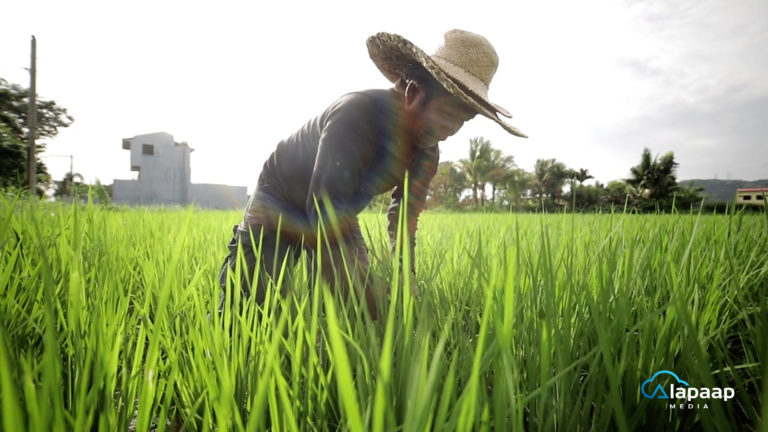Every centavo counts for a landless Filipino Farmer.
In a short documentary Binhi, Ungaw Eper and Ferdie Matamorosa shared a segment of their life stories. A series of wrestling to sustain a full stomach. A series of fighting to secure their children’s education. And a series of hope in spite of their hopeless condition.
The latest report of the Philippine Statistics Authority (PSA) indicates that farmer is among the top three poorest sectors in the country. It was a long time irony. The farmers lack, yet they are the producers of the society. In such studies done by scholars and non-government organizations in the past years, pertaining to the root cause of their poverty are the same with what our team found out.
An Indigenous Farmer
We met Eper Ungaw, a Hanunuo-Mangyan farmer in Oriental Mindoro. A single parent, living with his two children who are both studying in Secondary School. At 60, Ungaw walks approximately ten kilometers (back and forth) from the mountain to the market where he sells his products. Farming has been part of the Mangyan’s tradition. And because he did not even finish the first grade, he had no other choice but to do what he only knew for a living.
Ungaw is an evidence of the 7 out of 10 Filipino farmers who lack of proper education. What he just learned from his ancestors are what he tries to imitate. He is unaware on the latest planting system that could improve crops. Ungaw lacks the knowledge on proper management and product marketing. Some of the reasons why no matter how many seeds he planted, he would only come back home with only few coins of income and worst, no earnings at all.
“Minsan nga kung kailangan namin nakikiusap kami sa tindahan na makautang muna, may mga panahon po na hindi nabebenta ang aming kalakal.” (“When I can’t really sell any crop, I need to ask the small store owner in our village to lend us some food supplies.”)
As a Mangyan, it seems like it is a very ordinary to wallow into poverty. In addition, inequality based on norms remains to be a problem for those like Ungaw. Buyers usually purchase their goods in a very low price. Sometimes, not justifiable nor tantamount to their effort.
A Landless Farmer
Another farmer we have encountered was the sixty-three-year old, Ferdie Matamorosa of Laguna. He has been a rice farmer for fifty years but never had a chance to own a piece of rice land.
Unlike with normal teenagers who spend most of their time in studying and leisure, Ferdie grew up in the rice field until he got married and had eight children. His unfortunate experiences due to having a low income had started when he became a father. At times, sickness is really unpreventable especially to children. Ferdie told us how painful to see his son suffering from illness, but he has no enough money to immediately send him in the hospital.
“Hindi ko makakalimutan na karanasan katulad nun gang aking panganay ay magkasakit sya, ang ano ko doon halos hindi pa ako nakakapagbenta ng mga ani kong mga gulay o palay.” (“I will never forget the time when my first-born got sick. I had nothing. I could hardly sell anything from my harvest—vegetables or rice grains.”)
Same with how poverty-stricken families do, Ferdie had no option but to borrow money. They ran into micro-finance to fund their basic needs and emergency situations, including sickness. Mercy Matamorosa, Ferdie’s wife, has been very practical in budgeting especially when their children stepped into University.
“Pagdating na nila ng college kailangan na talagang mangutang sa micro-finance, kulang po talaga kaya kailangan mangutang para yung ibang expenses ay maresolbahan.” (“When our children went to college, we had no choice but to borrow money from micro-finance to supply our daily needs as well.”)
Ferdie’s family is just one of the many farmers’ family who can be called as “debt-ridden”. As a result of being landless, they earned a little, not sufficient for their daily needs. Hence, the situation gets worse as the price of palay (rice grain) fell.
“Malaking dagok po ito sa mga tulad kong magsasaka, ngayon na napaka mura ng palay, 500 hundred lang po ang isang sako ng palay, sa dalawang kaban namin na ibebenta, ang pera non ay isang libo lang, ay sa sampu po kami, ang bigsabihin kikita lang kami dun ng 100 sa isang araw kaya napaka bigat po ng magsasakang walang sariling palayan.” (“This is a huge struggle for us, farmers, when the price of rice grain dropped to 500 pesos per sack. In two sacks or 1,000kgs of rice grain that we can sell, we can get 1,000 pesos which will be parted to ten farmers. Each of us will only get 100 pesos.)
Our interview proved that being an ordinary farmer in the third world country like the Philippines is much challenging. In most cases, they tend to ignore health issues they have for the sake of their family. Due to everyday heat exposure, farmer’s strength diminishes and slowly getting prone into sickness. There is a saying in Filipino, “Kapag may itinanim, may aanihin”. (“When you sow is what you reap”). It seems very fitting among the farmers but has never been totally experienced for the longest time.
This story was first shared in October 2019 on Alapaap Media YouTube Channel.
Written by Ricca Joice Adrada
